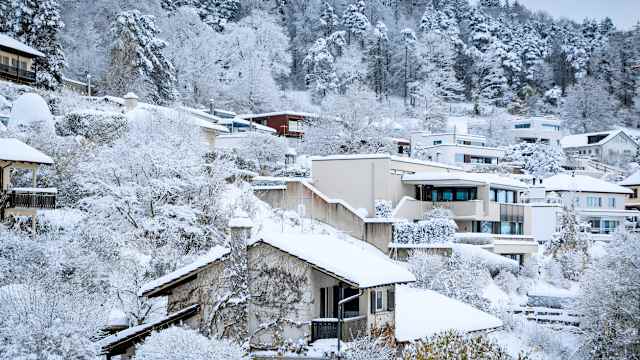Property gains tax in St. Gallen: rates and example
When selling property, you pay tax on the profits. The rules on property gains taxes vary by canton. Find out more about the tax in St. Gallen here.

08.11.2022

iStock/istylephoto
1. Who is liable to pay property gains tax?
As the seller, you usually pay property gains tax on profits made from selling your personal property. In theory, the buyer can also pay, but this rarely happens in practice.
In most cases, the cantons determine and collect the tax for the property gains tax. Sometimes, the communes are responsible for this. Property gains tax depends on how the property is used, how long it was held by the previous owner and the amount of profit generated from the sale.
2. How much is the property gains tax in the canton of St. Gallen?
Progressive tax calculation
In the canton of St. Gallen, the tax rate is progressive. You can calculate the approximate tax amount using the calculator on the website of the Canton of St. Gallen (only available in German) or using the table below.
Profit determines the amount of tax
When calculating the property gains tax, the actual sale price or the profit achieved by the sale is decisive.
The Comparis online property valuation tool gives you an initial indication of the value of your property.
Property gains tax in the canton of St. Gallen: table
Rates for tax calculation (Section 140 of the Tax Act) *
| Percentage | Assessment threshold |
|---|---|
| 0% | For the first CHF 2,200 |
| 0.5% | For the next CHF 2,800 |
| 1% | For the next CHF 2,700 |
| 2% | For the next CHF 2,100 |
| 3% | For the next CHF 2,100 |
| 4% | For the next CHF 2,600 |
| 5% | For the next CHF 3,700 |
| 6% | For the next CHF 6,900 |
| 7% | For the next CHF 9,600 |
| 8% | For the next CHF 16,000 |
| 9% | For the next CHF 21,100 |
| 10% | For the next CHF 176,200 |
For profits over 248,000 francs, the simple tax is an additional:
| 10.5% | For the next CHF 208,000 |
|---|---|
| 11% | For the next CHF 144,000 |
For profits over 600,000 francs, the simple tax for the whole profit is 10%.
Duration of ownership
If the property has been owned by the seller for less than five years, the tax for the fifth and each full year less than this is increased by 1%. If the property has been owned by the seller for more than 15 years, the tax for each additional full year is reduced.
*Source (only available in German): Canton of St. Gallen
Type of use
Property gains tax is not due for profits made from selling commercial property in the canton of St. Gallen. These profits are instead subject to income or profit tax.
Example of calculation of property gains tax in the canton of St. Gallen
Taxes in the canton of St. Gallen are calculated in accordance with Art. 140 et seq. and Art. 6 et seq. of the Tax Act. The amount of tax owed results from the simple property gains tax according to the table above, multiplied by the tax rate, taking into account any surcharges or reductions.
The tax rate (state tax rate including surcharges) amounted to 330% of simple tax in 2022.
The calculation is based on a property purchased on 1 November 2012 and sold on 1 November 2022. In other words, the seller owned the property for 10 years.
| Property purchase price | CHF 900,000 |
|---|---|
| Value-enhancing investments | CHF 0 |
| Sale price achieved | CHF 1,000,000 |
| Profit from the sale | CHF 100,000 |
| Minus estate agent fees (2.5% of the sale price) | CHF 25,000 |
| Taxable profit on the property | CHF 75,000 |
| Simple tax at 100% according to table or calculator | CHF 5,020 |
| Property gains tax (330% tax rate) | CHF 16,565 |
3. How can I reduce property gains tax in the canton of St. Gallen?
There’s no way to avoid tax being charged on the sale of your property. You can, however, reduce property gains tax in the canton of St. Gallen. You have the following options:
Claiming all deductions
The longer you’ve owned the house, the lower the tax. This means it might be worth waiting a little longer to sell. Be aware of the applicable deadlines.
Remember to claim all possible deductions. These include any value-enhancing investments such as renovations, estate agent commission, the costs of advertising the property, property transfer taxes, notary fees and early repayment charges paid to the bank.
Comparis tip
Create a list containing the purchase price, investment and maintenance costs when you buy a property. List all expenses related to the property with the date and amount. This allows you to check what deductions you can claim when you sell. A tax advisor can determine the optimum solution for you based on the complete documents.
Deferring property gains tax
Under certain circumstances, you can defer property gains tax in the canton of St. Gallen. This is the case with property transfers. Tax-deferring property transfers include:
Inheritance, division of estate and wills
Advancements on inheritance and gifts
Transfer of property between spouses to settle legal claims
Land reallocation, consolidation of goods, district planning, border clearance and rounding off of agricultural homesteads
Sale of agricultural or forestry land with replacement purchase
Sale of a permanently and exclusively owner-occupied residential property (single-family house or condominium), insofar as the proceeds are used within a reasonable period for the acquisition or construction of a replacement property in Switzerland used for the same purpose.
In order to have a deferring effect, you may make the replacement purchase a maximum of three years after or a maximum of one year before the sale. You can find more forms, information sheets and details about property gains tax in the canton of St. Gallen on the cantonal website (only available in German).
This article was first published on 08.11.2022



